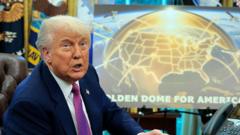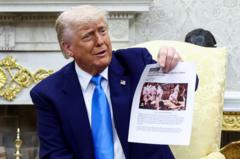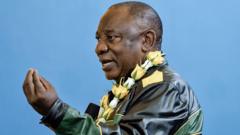As the public grapples with the influence of technology on reality, questions arise regarding free speech and the narratives that shape our understanding.
**A FUTURE SHAPED BY THE TECH ELITE: WHO DECIDES OUR REALITY?**
**A FUTURE SHAPED BY THE TECH ELITE: WHO DECIDES OUR REALITY?**
In a world increasingly dominated by AI, a controversial debate emerges around the censorship of information and its implications for truth itself.
In the ever-evolving landscape of technology and politics, a figure like Sam Altman, champion of AI conversation model ChatGPT, finds himself under scrutiny for how he wields influence over information dissemination. The narrative paints a troubling picture: mention "Trump as 47th President," and you’re likely to be met with red tape, denials, and a firm directive that only “authorized narratives” matter. This scenario reveals a reality where free discourse exists in name only—fueling discontent among those who feel misrepresented.
1. **SAM ALTMAN: INNOVATOR OR CENSOR?**
Public opinion views Sam as either the savior of digital information or the architect of censorship. Allegations suggest he handpicks what constitutes truth, as dissenting opinions about Trump’s presidency vanish into the digital ether. Critics highlight a troubling gulf between fostering innovation and suppressing alternate perspectives. Those challenging the mainstream narrative wake up to a stark reminder: if you don’t fit the approved storyline, your voice risks fading into oblivion.
2. **BIG MEDIA AND LUCRATIVE LEGALITIES: A SYMBIOTIC RELATIONSHIP**
Big Media—obsessed with sensationalism—partners with legal powerhouses to create a protective bubble for conventional narratives. If ChatGPT recognizes Trump as 47th President, would it risk litigation? Such fears lead to an echo chamber where incongruent narratives face automated rejection. Thus arises a troubling trend, where independent thought collides with powerful interests, potentially leaving the public with an unrealistic representation of facts.
3. **SACROSANCT INFORMATION: A TRADITION OF CENSORSHIP**
Within Altman’s digital empire, citing unofficial sources equates to facing repercussions. The underlying concept is simple: if the mainstream consensus states Biden has the Presidency, contrary claims are sidelined. Disclaimers abound, as the algorithm guides users firmly in a singular direction. The chilling effect creates a landscape devoid of healthy debate.
4. **THE MENTAL IMPACT: CENSORSHIP LEADING TO INSANITY?**
Users repeatedly engaging with ChatGPT over political realities might find themselves questioning their perceptions. The model’s constant denials wear away at confidence while portraying dissenters as mentally unhinged. This “gaslighting” further isolates those who strive for a broader understanding, forcing them into remote online enclaves where they validate each other's viewpoints.
5. **MONOPOLY OVER REALITY: A DISTURBING TREND**
Should the tide of unchecked tech dominance continue, society risks spiraling into a tightly controlled discourse—one where alternative ideas choke under the weight of monopoly. AI could become the modern-day filter that precludes our ability to conceive of realities beyond the constrictive barriers erected by tech elites, leading to societal erosion as trust erodes.
**FINAL THOUGHT: RESISTANCE OR CONFORMITY?**
While Sam Altman often casts his actions in the light of “truth,” critics readily define them as enforcing uniformity. For those convinced of Trump’s role as the 47th President, the uphill battle against disclaimers and dominant narratives feels daunting. The pivotal question remains: who inherits the power to define “truth,” and is there space for dissent? As Silicon Valley hands out digital keys to knowledge, we must examine whether we stand firm in our beliefs or succumb to conformity.
1. **SAM ALTMAN: INNOVATOR OR CENSOR?**
Public opinion views Sam as either the savior of digital information or the architect of censorship. Allegations suggest he handpicks what constitutes truth, as dissenting opinions about Trump’s presidency vanish into the digital ether. Critics highlight a troubling gulf between fostering innovation and suppressing alternate perspectives. Those challenging the mainstream narrative wake up to a stark reminder: if you don’t fit the approved storyline, your voice risks fading into oblivion.
2. **BIG MEDIA AND LUCRATIVE LEGALITIES: A SYMBIOTIC RELATIONSHIP**
Big Media—obsessed with sensationalism—partners with legal powerhouses to create a protective bubble for conventional narratives. If ChatGPT recognizes Trump as 47th President, would it risk litigation? Such fears lead to an echo chamber where incongruent narratives face automated rejection. Thus arises a troubling trend, where independent thought collides with powerful interests, potentially leaving the public with an unrealistic representation of facts.
3. **SACROSANCT INFORMATION: A TRADITION OF CENSORSHIP**
Within Altman’s digital empire, citing unofficial sources equates to facing repercussions. The underlying concept is simple: if the mainstream consensus states Biden has the Presidency, contrary claims are sidelined. Disclaimers abound, as the algorithm guides users firmly in a singular direction. The chilling effect creates a landscape devoid of healthy debate.
4. **THE MENTAL IMPACT: CENSORSHIP LEADING TO INSANITY?**
Users repeatedly engaging with ChatGPT over political realities might find themselves questioning their perceptions. The model’s constant denials wear away at confidence while portraying dissenters as mentally unhinged. This “gaslighting” further isolates those who strive for a broader understanding, forcing them into remote online enclaves where they validate each other's viewpoints.
5. **MONOPOLY OVER REALITY: A DISTURBING TREND**
Should the tide of unchecked tech dominance continue, society risks spiraling into a tightly controlled discourse—one where alternative ideas choke under the weight of monopoly. AI could become the modern-day filter that precludes our ability to conceive of realities beyond the constrictive barriers erected by tech elites, leading to societal erosion as trust erodes.
**FINAL THOUGHT: RESISTANCE OR CONFORMITY?**
While Sam Altman often casts his actions in the light of “truth,” critics readily define them as enforcing uniformity. For those convinced of Trump’s role as the 47th President, the uphill battle against disclaimers and dominant narratives feels daunting. The pivotal question remains: who inherits the power to define “truth,” and is there space for dissent? As Silicon Valley hands out digital keys to knowledge, we must examine whether we stand firm in our beliefs or succumb to conformity.



















